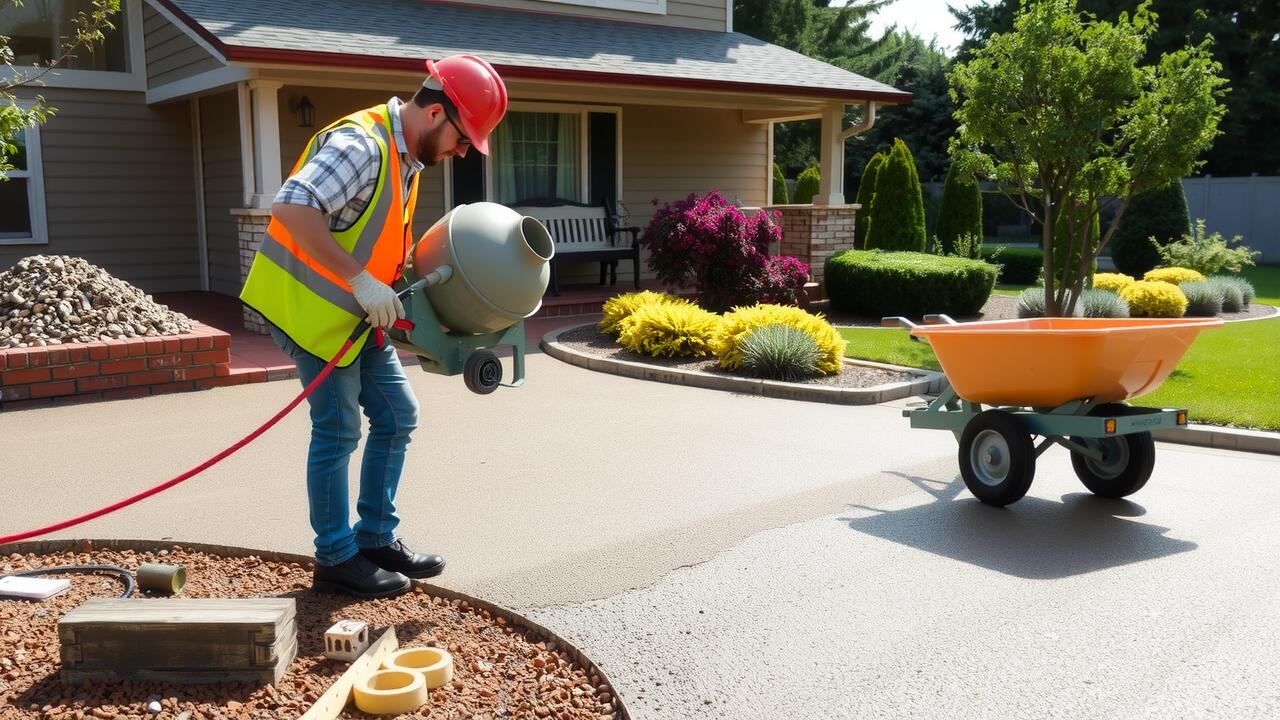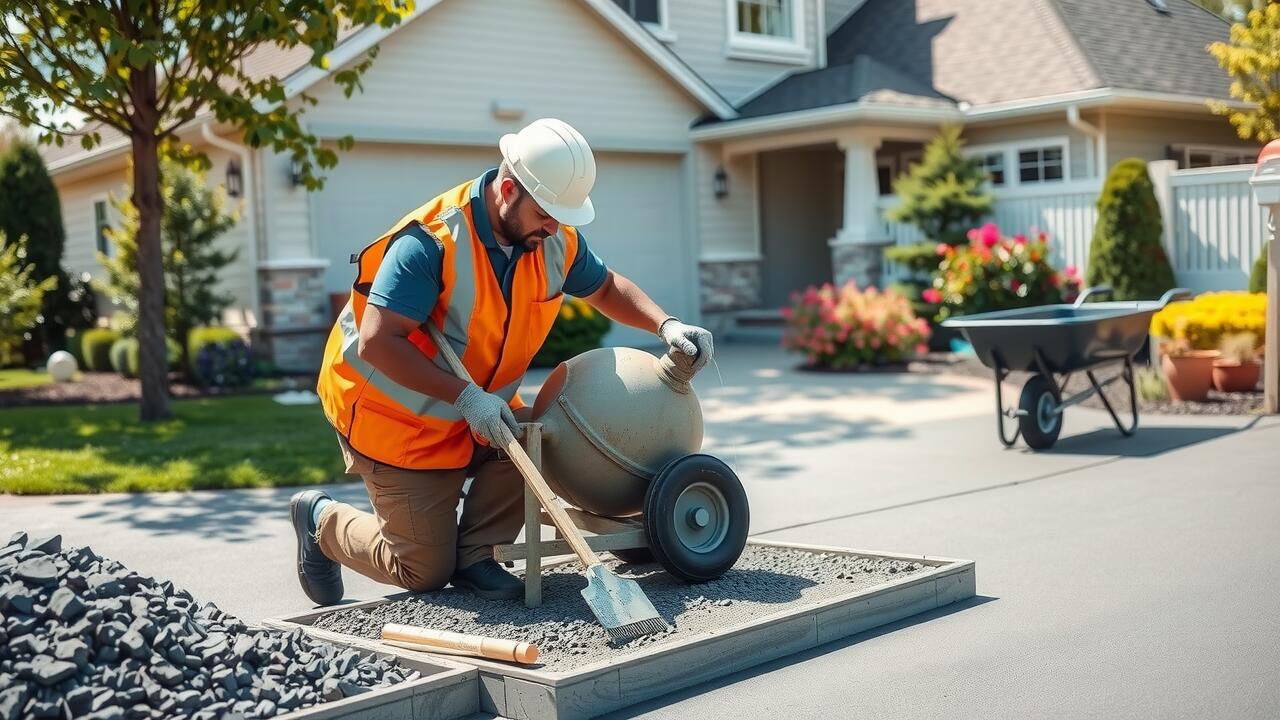
Paver Driveways
Paver driveways are known for their aesthetic appeal and versatility. They come in various shapes, sizes, and colors, allowing homeowners to create unique designs that complement their property. This type of driveway can enhance the overall look of a home, providing both functionality and curb appeal. The installation process typically involves preparing the base, placing the pavers, and filling in the joints with sand. Many people appreciate that paver driveways can be laid out in patterns that suit their personal taste while also being manageable for DIY projects.
In terms of installation ease, paver driveways offer several advantages. The process does not usually require specialized equipment, making it accessible for individuals with moderate DIY skills. If a paver becomes damaged, it is often easy to replace without disrupting the entire driveway. Driveway installation with pavers also allows for effective drainage, reducing concerns over flooding and standing water. This versatility makes paver driveways a popular choice for those looking to enhance their outdoor spaces.
Aesthetic Appeal and Installation Ease
Paver driveways offer a unique blend of aesthetic appeal and practicality. Available in various shapes, colors, and materials, they can enhance the charm of any home. The versatility of pavers allows for creative patterns and designs, turning a typical driveway into a stylish focal point. Even after installation, pavers maintain their visual appeal since they are resistant to fading and weather damage.
When it comes to driveway installation, pavers are relatively straightforward. Homeowners can tackle this project with the right tools and guidance, making it accessible for DIY enthusiasts. The interlocking nature of pavers simplifies the process, as they fit together without the need for extensive preparation or concrete setting time. This ease of installation can significantly reduce labor costs while providing a durable surface that stands up to everyday wear.
Permeable Driveways
Permeable driveways are gaining popularity due to their ability to manage stormwater effectively. This type of driveway allows rainwater to pass through, promoting natural filtration and reducing runoff. The installation of permeable materials creates a practical and eco-friendly solution for homeowners seeking to minimize their environmental footprint. Choosing permeable options can lead to a more sustainable landscape and help prevent drainage problems common with traditional pavement.
When considering driveway installation, evaluating the local climate and the soil type can be crucial in determining the best permeable materials. These driveways may require specific aggregates or pavers that encourage water infiltration. While some may perceive permeable driveways as more complex, many installers find that they can be straightforward with the right preparation. Proper grading and base design enhance both the functionality and longevity of the driveway.
Environmental Advantages
Permeable driveways offer significant environmental advantages that make them an appealing choice for homeowners. These systems allow water to infiltrate through the surface, reducing runoff and helping to recharge groundwater supplies. This natural absorption can mitigate issues such as flooding and erosion, which are often exacerbated by traditional impervious driveway materials. Driveway installation using permeable pavers or porous asphalt can contribute to more sustainable urban landscapes.
Moreover, permeable driveways can significantly improve water quality. As rainwater percolates through the surface, it passes through layers of gravel or soil that filter out pollutants before they reach the groundwater. This can lead to cleaner water flowing into local streams and rivers. Choosing permeable materials for driveway installation not only supports environmental health but also aligns with growing concerns over stormwater management and urban development.
Choosing the Right Driveway for Your Space
Selecting the right driveway for your space involves several key considerations. Begin by assessing your budget, as various materials have different costs associated with their installation and maintenance. The size and layout of your property also play a significant role in determining which driveway type will work best. A well-planned driveway installation can enhance your home’s curb appeal while providing functionality.
Additionally, consider the local climate and drainage requirements. Some driveways, such as permeable options, offer solutions for areas with heavy rainfall by managing water runoff effectively. An appropriate choice based on these factors not only simplifies driveway installation but can also contribute to the longevity and durability of the surface. Each type of driveway offers unique benefits, making it essential to align your choice with both practical needs and aesthetic preferences.
Factors to Consider
When considering driveway installation, various factors play a crucial role in determining the best option for your property. Budget is often a primary concern, as different materials come with distinct price points. Additionally, the climate in your region can influence your choice; some surfaces perform better in cold weather, while others are more suited for warmer environments. Homeowners should also think about the intended use of the driveway. Will it accommodate heavy vehicles or simply serve as a path for light foot traffic?
Another important consideration is maintenance. Some driveways require more regular upkeep than others, which can affect long-term costs and labor. Aesthetic preferences should also weigh in. The design of the driveway should complement the overall architecture of the home and the landscape. Lastly, consider the environmental impact of the material chosen. Permeable options can help manage stormwater runoff while traditional materials may have different sustainability implications. Each of these factors contributes to the overall effectiveness and satisfaction with the driveway installation.
FAQS
What is the easiest type of driveway to install?
Paver driveways are often considered one of the easiest types to install due to their modular nature, allowing for straightforward placement and adjustment.
Are permeable driveways difficult to install?
Permeable driveways can be more complex to install than paver driveways, as they require proper drainage systems and specific materials to ensure effectiveness.
What factors should I consider when choosing a driveway?
Key factors to consider include your budget, the climate in your area, the desired aesthetic appeal, maintenance requirements, and environmental impact.
Can I install a driveway myself, or do I need a professional?
While some homeowners may choose to install a paver driveway themselves, hiring a professional is recommended for best results, especially for larger or more complex projects.
How long does it typically take to install a paver driveway?
The installation of a paver driveway can take anywhere from a few days to a week, depending on the size of the area and the specific installation conditions.
